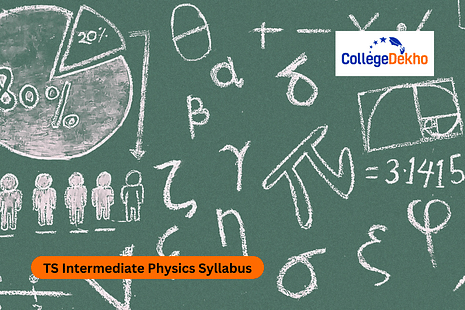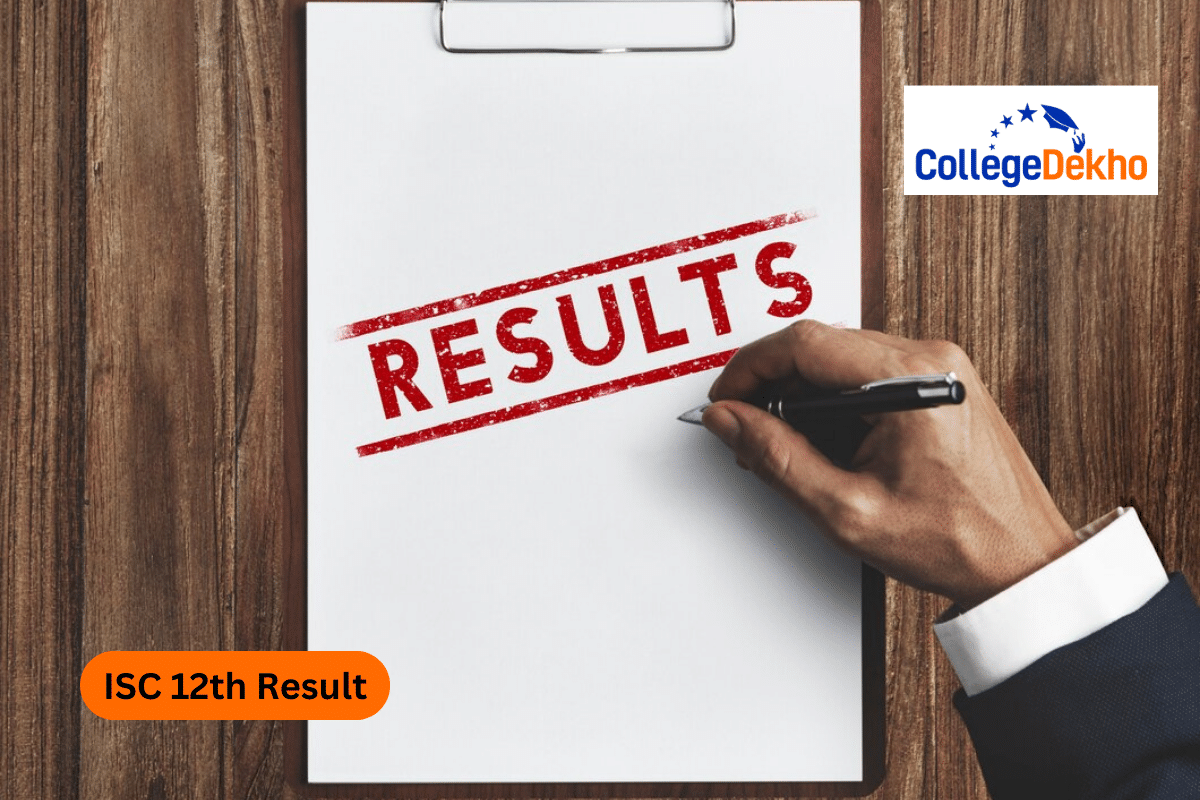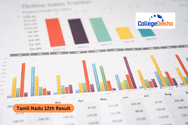- About TS Intermediate Physics Syllabus 2024-25
- TS Intermediate Physics Syllabus 2024-25 Download PDF
- TS Intermediate Physics Syllabus 2024-25: Course Structure
- TS Intermediate Physics Syllabus 2024-25: Units
- TS Intermediate Physics Practical Syllabus 2024-25
- TS Intermediate Physics Question Paper Design 2024-25
- TS Intermediate Physics Books 2024-25
- Preparing For TS Intermediate Physics Exam 2024-25
- Faqs


Never Miss an Exam Update
About TS Intermediate Physics Syllabus 2024-25
TS Intermediate Physics Syllabus 2024-25 is listed on the official website of the Telangana Board of Intermediate Education to be downloaded in a PDF format. The official PDF lists the annual plan that the teachers need to follow along with the syllabus for Physics. Some of the important chapters included in the Physics syllabus are Wave, Ray Optics And Optical Instruments, Wave Optics, Electric Charges And Fields, Electrostatic Potential And Capacitance, and Current Electricity. Etc. The theory paper in Physics will be conducted for 60 marks. Students can download the latest TS Intermediate Physics Sample Paper 2024-25 for an effective revision.
The syllabus document is one of the most important documents needed by students when appearing for exams. It has detailed information about the curriculum along with the chapters included in each unit. Students can also check the information about the topics that are assigned for the practical exams by downloading the latest syllabus PDF from the official website of the Board of Intermediate Education Telangana. Check more information about the TS Intermediate Physics Syllabus 2024-25 here.
Also Read: TS Inter Result 2025
TS Intermediate Physics Syllabus 2024-25 Download PDF
Right now, the PDF of the syllabus is also available on the official website of the Telangana Board of Intermediate Education. Students can download the PDF by clicking on the direct link given below:
TS Intermediate Physics Syllabus 2024-25: Course Structure
A total of 16 units are included in the TS Intermediate Physics Exam Pattern 2024-25 . Students can refer to the weightage allotted for each unit from the table given below:
Name of the Topic | Marks Weightage |
|---|---|
Waves | 8 |
Ray optics and optical instruments | 4 |
Wave optics | 2 |
Electric charges and fields | 4 |
Electric potential and capacitance | 4 |
Current electricity | 8 |
Moving charges and magnetism | 2 |
Magnetism and Matter | 2 |
Electromagnetic induction | 4 |
Alternating current | 2 |
Electromagnetic Waves | 2 |
Dual nature of Radiation and Matter | 2 |
Atoms | 4 |
Nuclei | 8 |
Semiconductor Electronics | 2 |
Communication systems | 2 |
TS Intermediate Physics Syllabus 2024-25: Units
Students can refer to the chapters and the topic included in each chapter of the TS Intermediate Physics Syllabus 2024-25 from the table given below:
Chapters | Topics |
|---|---|
Chapter 1: Wave | 1.1 Introduction 1.2 Transverse and Longitudinal waves 1.3 Displacement relation in a progressive wave 1.4 Speed of a Travelling Wave 1.5 The principle of superposition of waves, 1.6 Reflection of waves 1.7 Beats 1.8 Doppler Effect |
Chapter– 2: Ray Optics And Optical Instruments | 2.1 Introduction 2.2 Reflection of light by Spherical Mirrors 2.3 Refraction 2.4 Total Internal Reflection 2.5 Refraction at Spherical Surfaces and by Lenses. 2.6 Refraction through a Prism 2.7 Dispersion by a Prism 2.8 Some Natural phenomena due to Sunlight 2.9 Optical Instruments |
Chapter – 3: Wave Optics | 3.1 Introduction 3.2 Huygens Principle 3.3 Refraction and Reflection of Plane Waves using Huygens Principle 3.4 Coherent and Incoherent Addition of Waves 3.5 Interference of Light Waves and Young’s Experiment 3.6 Diffraction 3.7 Polarisation |
Chapter – 4: Electric Charges And Fields | 4.1 Introduction 4.2 Electric Charges 4.3 Conductors and Insulators 4.4 Charging by Induction 4.5 Basic Properties of Electric Charge 4.6 Coulomb’s Law 4.7 Forces between Multiple Charges 4.8 Electric Field 4.9 Electric Field Lines 4.10 Electric Flux 4.11 Electric Dipole 4.12 Dipole in a uniform external field 4.13 Continuous Charge Distribution 4.14 Gauss’s Law 4.15 Application of Gauss’ Law |
Chapter 5: Electrostatic Potential And Capacitance | 5.1 Introduction 5.2 Electrostatic Potential 5.3 Potential due to a point charge 5.4 Potential due to an Electric Dipole 5.5 Potential due to a System of Charges 5.6 Equipotential Surfaces 5.7 Potential Energy of a System of Charges 5.8 Potential Energy in an External field 5.9 Electrostatics of Conductors 5.10 Dielectrics and Polarisation 5.11 Capacitors and Capacitance 5.12 The Parallel Plate Capacitor 5.13 Effect of Dielectric on Capacitance 5.14 Combination of Capacitors 5.15 Energy Stored in a Capacitor 5.16 Van de Graaff Generator |
Chapter – 6: Current Electricity | 6.1 Introduction 6.2 Electric current 6.3 Electric current in conductors 6.4 Ohm’s Law 6.5 Drift Electrons and Origin of Resistivity 6.6 Limitations of Ohms’s Law 6.7 Resistivity of various Materials 6.8 Temperature Dependence of Resistivity 6.9 Electric Energy, Power 6.10 Combination of Resistors – Series and Parallel 6.11 Cells, emf, Internal Resistance 6.12 Cells in Series and in Parallel 6.13 Kirchhoff’s Laws 6.14 Wheatstone Bridge 6.15 Meter Bridge 6.16 Potentiometer |
Chapter – 7: Moving Charges And Magnetism | 7.1 Introduction 7.2 Magnetic Force 7.3 Motion in a Magnetic Field 7.4 Motion in Combined Electric and Magnetic Fields 7.5 Magnetic Field due to a Current Element, Biot-Savart Law 7.6 Magnetic Field on the Axis of a Circular Current Loop 7.7 Ampere’s Circuital Law 7.8 The Solenoid and the Toroid 7.9 Force between two Parallel Currents, The Ampere(Unit) 7.10 Torque on Current Loop, Magnetic Dipole 7.11 The Moving Coil Galvanometer |
Chapter – 8 Magnetism And Matter | 8.1 Introduction 8.2 The Bar Magnet 8.3 Magnetism and Gauss’s Law 8.4 The Earth’s Magnetism 8.5 Magnetisation and Magnetic Intensity 8.6 Magnetic Properties of Materials 8.7 Magnets and Electromagnets |
Chapter – 9: Electromagnetic Induction | 9.1 Introduction 9.2 The experiments of Faraday and Henry 9.3 Magnetic Flux 9.4 Faraday’s Law of Induction 9.4 Faraday’s Law of Induction 9.5 Lenz’s Law and Conservation of Energy 9.6 Motional Electromotive Force 9.7 Energy Consideration: A Quantitative Study 9.8 Eddy Currents 9.9 Inductance 9.10 AC Generator |
Chapter 10: Alternating Current | 10.1 Introduction 10.2 AC voltage applied to a Resistor 10.3 Representation of AC Current and Voltage by Rotating Vectors- Phasors 10.4 AC voltage applied to an Inductor 10.5 AC voltage applied to a Capacitor 10.6 AC voltage applied to a Series LCR Circuit 10.7 Power in AC Circuit: The Power Factor 10.8 LC Oscillations 10.9Transformers |
Chapter – 11: Electromagnetic Waves | 11.1 Introduction 11.2 Displacement Current 11.3 Electro Magnetic Waves 11.4 Electromagnetic Spectrum |
Chapter–12: Dual Nature Of Radiation And Matter | 12.1 Introduction 12.2 Electron Emission 12.3 Photoelectric Effect 12.4 Experimental Study of Photoelectric Effect 12.5 Photoelectric Effect and Wave Theory of Light 12.6 Einstein’s Photoelectric Equation: Energy Quantum of Radiation 12.7 Particle Nature of Light : The Photon 12.8 Wave Nature of Matter 12.9 Davisson and Germer Experiment |
Chapter–13: Atoms | 13.1 Introduction 13.2 Alpha-particle Scattering and Rutherford’s Nuclear model of Atom 13.3 Atomic Spectra 13.4 Bohr Model of the Hydrogen Atom 13.5 The Line Spectra of the Hydrogen Atom 13.6 De Broglie’s Explanation of Bohr’s Second Postulate of Quantisation |
Chapter–14: Nuclei | 14.1 Introduction 14.2 Atomic Masses and Composition of Nucleus 14.3 Size of the Nucleus 14.4 Mass- Energy and Nuclear Binding Energy 14.5 Nuclear Force 14.6 Radioactivity 14.7 Nuclear Energy |
Chapter–15: Semiconductor Electronics: Materials, Devices And Simple Circuits | 15.1 Introduction 15.2 Classification of Metals, Conductors and Semiconductors 15.3 Intrinsic Semiconductor 15.4 Extrinsic Semiconductor 15.5 p – n junction 15.6 Semi conductor diode 15.7 Application of Junction Diode as a Rectifier 15.8 Special Purpose p-n Junction Diodes 15.9 Junction Transistor 15.10 Digital Electronics and Logic Gates 15.11 Integrated Circuits |
Chapter– 16: Communication Systems | 16.1 Introduction 16.2 Elements of communication system 16.3 Basic Terminology used in Electronic Communication Systems 16.4 Bandwidth of Signals 16.5 Bandwidth of Transmission Medium 16.6 Propagation of Electromagnetic Waves 16.7 Modulation and its Necessity 16.8 Amplitude Modulation 16.9 Production of Amplitude Modulated Wave 16.10 Detection of Amplitude Modulated Wave |
TS Intermediate Physics Practical Syllabus 2024-25
Practical exams will also be conducted for subjects like Physics. Students can refer to the chapters that will be included in the practical syllabus from the pointers given below:
- Velocity of sound by Resonance apparatus
- Determination of focal length of concave mirror
- Determination of focal length of convex lens
- The refraction index of the prism
- Meter bridge
- Magnetic lines of force
- Ohms law
- Tangent Galvanometer
- P-N Junction diode
- Transister Characteristics
TS Intermediate Physics Question Paper Design 2024-25
Students must have perfect knowledge regarding the question paper that will be provided by the Board of Intermediate Education Telangana in the exams. Check out the question paper design for the same from the pointers given below:
- The maximum marks allotted for the question paper will be 60 marks.
- The duration of the paper will be three hours.
- The question paper will be divided into three sections.
- Section A will consist of 10 very short answer type questions for 2 marks each. Students need to answer all the questions included in this section and there will be no internal choices present in this section.
- Section B will consist of 6 short answer type questions for 4 marks each. Internal choices will be included in this section.
- Section C will consist of two very long answer type questions for 8 marks each. Internal choices will be included in this section also.
- The question paper will be available in both English and regional languages.
TS Intermediate Physics Books 2024-25
There are a bunch of side books that the students can consider when appearing for the board exam such as:
- AP & TS Star Q Senior Inter Physics Study Material 2024-25 (English Medium)
- TS & AP Inter II-PHYSICS (T.M)(Test Paper)-2025
- Textbook For Intermediate Second Year PHYSICS [ ENGLISH MEDIUM ]
- Problems In General Physics By IE Irodov's Vol-I
- Bullet Baby Junior Inter Physics 2025
- Concept Of Physics - Part 1 & 2 2023 - 2024 Session Set Of 2 Books By Hc Verma
- Objective Physics (R-427)
Preparing For TS Intermediate Physics Exam 2024-25
Physics can be difficult to tackle for the students who struggle in such concept-based subjects. Check out some tips and tricks that will help you score good marks easily from the pointers given below:
- Do not forget to focus on numerals after completing your theory portion so that you can easily score extra marks in the exams. Make sure to also clear your concepts and learn about the derivation of the theorems in detail with the help of your teachers or tutors.
- To remember information after the end of every lecture, try to make small handwritten notes in a separate notebook to revise during the exams. Always note down important definitions on sticky notes and stick them near your study desk to revise easily.
- Do not forget to solve model test papers available on the Internet or TS Intermediate Physics Previous Year Question Paper uploaded by the Board of Intermediate Education Telangana on their official website to assess your preparation level.
- Take mock tests for different chapters to check whether or not you have covered every aspect of that chapter. Do not leave any topic for last-minute preparation as it may lead to exam stress and anxiety.
- Always make figures and graphs wherever necessary to not lose any marks during the board exam.
Download the latest PDF of the TS Intermediate Physics Syllabus 2024-25 as uploaded on the official website of the Board of Intermediate Education Telangana to check the units and chapters covered in the syllabus and kick-start your study sessions. Refer to the syllabus PDF to check the marks allotted for each unit and create a study plan accordingly.
FAQs
Every chapter is important in the TS Intermediate Physics Syllabus 2024-25 however the students must focus more on Current Electricity, Atoms, And Nuclei. Make sure to complete the syllabus before diving into the model test papers.
Yes, students can revise the TS Intermediate Physics Syllabus 2024-25 by taking into account the model test papers available on the official website of the Telangana Board of Intermediate Education.
Make sure to refer to the latest TS Intermediate Physics Syllabus 2024-25 before starting your preparations. Try to allocate proper timings for each chapter and make a study plan accordingly.
There are a total of 16 chapters included in the TS Intermediate Physics Syllabus 2024-25. Students have to make sure that they are completing the syllabus on time to score good marks.
Was this article helpful?

























